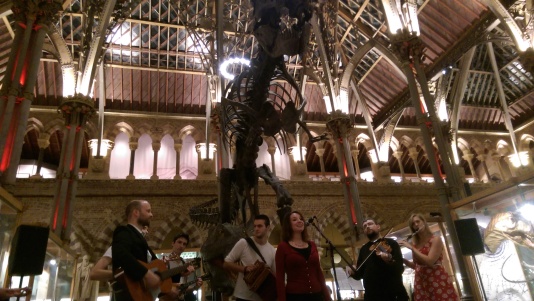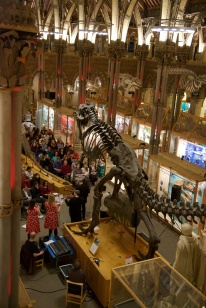Head and the Heart: my best scientific presentation
On the 10th of October 2015, The Wellcome Trust Centre for Human Genetics, with support from Cancer Research UK and The Wellcome Trust, put on an evening of storytelling and music where researchers from the Centre, the Jenner Institute, and Cancer Research UK came together to tell stories about their lives as scientists, with live musical accompaniment from Oxford-based folk band “James Bell and the Half Moon All Stars”. Irina Polyakhina, from the Julian Knight group, took part as one of the storytellers.


Irina telling her story during "The Heart and the Head"
Just be honest with me – what do you think of when you hear "science"? Or even worse – "my friend is a scientist, and he is going to talk about..." You feel like running away as soon as possible, because science equals rational, equals non-emotional, equals boring. Scientists do not use (or even have?) emotions in their everyday life, because they are scientists – they are heads, brains, master minds. Or, at least, that's what we often think about scientists.
Being a scientist myself, I am used to such public opinion. I am also used to the fact that other scientists are used to it. And we sort of don't bother changing it. We love what we do, and we treat our project as if they were our child – even getting a bit anxious on holidays when we are not able to stay in touch with our "children" 24/7. We do have feelings for science, but we are probably not very good at showing them.
 So when I heard about a chance to tell a broader audience that scientists not only use their heads, but also their hearts – and I'm not sure which one we use more often – it sounded exciting to try and tell other people about what you do, but without 'making a presentation' or using jargon.
So when I heard about a chance to tell a broader audience that scientists not only use their heads, but also their hearts – and I'm not sure which one we use more often – it sounded exciting to try and tell other people about what you do, but without 'making a presentation' or using jargon.
The goal was to tell a short story about how something in your everyday scientific routine made you feel something – in other words, when you used your heart and not only your head. We decided to come together one evening, invite our friends, families, and also strangers, and show them that we are as emotional as any other human being. We wanted to destroy the concept of scientists being boring and only science-centred.
And I think we managed it. Five of us were telling a short story each, and the stories ranged from memories of a trip to Africa to the observations made using MRI scans. Even being so different, all the stories – accompanied by fantastic live music – had at least one thing in common; they showed a different side of us.
I have given scientific presentations before. And this time could have been no different (except for having a humongous T-Rex right behind me – we got a chance to tell our stories in the Oxford University Museum of Natural History). You prepare beforehand and repeat your story multiple times to make it sound smooth, you stand in front of a crowd, talk into the microphone, and try to convince them that your story makes sense. But this experience was incredibly different. This time my goal was not to convince anyone – it was to share how certain things made me feel. While talking, I could see worried faces, upset faces, empathetic faces – and I could see how they changed throughout the story. It felt as if people were watching a movie starring myself – judging from their reactions and expressions I could see they were living through my story with me. And, surprisingly, getting the applause at the end was not even the best part. The best part was to see people smiling, being happy for me that my story ended well, looking at me and – as I read – thinking "yes, I understand you, the exact same thing happened to me and I'm glad we both got out of it".
I was not sharing my research, I was sharing my feelings – and while my passion is research, rather than feelings this, being about emotions, felt like the best talk I have ever given.
You can listen to the entire evening of storytelling and music via the University podcasts page.

Feedback from a member of the audience
Originally posted on the Wellcome Trust Centre for Human Genetics blog.

